The Covid-19 pandemic has hindered progress on the treatment for HIV, tuberculosis (TB), and malaria, according to Global Fund, a Geneva-based partnership of governments, civil society, technical agencies, and private sector bodies working on the three diseases, which have a high prevalence in Africa.
In many countries, Covid-19 has overpowered health systems and resources have been diverted from fighting HIV, TB, and malaria to dealing with the pandemic, says Global Fund, in its latest annual report. This is the first time since 2002 when the fund was established, that key prevention and testing services have declined compared to the previous year.
“The impact of Covid-19 in the fight against HIV, TB, and malaria and the communities we support has been devastating,” the fund’s executive director, Peter Sands, says in the report.
The Global Fund mobilizes and invests more than $4 billion annually to support to HIV, TB, and malaria programs in more than 100 countries, including 53 in Africa.
HIV, TB and malaria kill hundreds of thousands every year
The three diseases are common in Africa and they kill hundreds of thousands in the region every year, with the continent having the highest number of cases of HIV and malaria globally and the second-highest for TB.
With the onset of the pandemic, the continent’s already insufficient medical resources were further stretched, leading to disruption in access to medical information and services for people. Many countries effected lockdowns, which also disrupted provision of medical services.
For TB, the report says, the number of people who were treated for its drug-resistant type fell by 19% in 2020 compared to 2019; it reduced by 37% for those on treatment for extensively drug-resistant TB; and 16% for HIV-positive TB patients on antiretroviral treatment as well as TB treatment.
For HIV, the report adds, while the number of HIV-positive people receiving antiretroviral treatment increased by 9%, people served by HIV prevention programs and services declined by 11%, and HIV tests declined by 22%.
Malaria was less impacted. Suspected cases of malaria tested reducing by only 4.3%, the report says, with the low figure likely due to rapid adaptation of malaria services.
Covid-19 has spurred medical innovation
Despite these setbacks, Sands says, Covid-19 has spurred innovation in fighting the three diseases, such as Nigeria taking advantage of the opportunity of people going to health clinics for Covid-19 tests to test them for HIV as well, and community health workers and volunteers in many countries changing from central distributions of mosquito nets to delivering them door to door.
“The fight against Covid-19 should be a catalyst to finish the unfinished fights against HIV, TB and malaria,” Sand says. “If we can continue to innovate and collaborate – at global, national and local levels – we can end HIV, TB and malaria, beat Covid-19 and build a much stronger foundation for pandemic preparedness and response.”
Yacine Djibo, founder and executive director of Speak Up Africa, a Dakar-based policy and advocacy organization for issues such as malaria and neglected tropical diseases, says Global Fund’s findings show the urgency to step up investment and collaboration to ensure that essential services and operations continue to protect the lives of people affected by malaria, HIV and TB, and other diseases.
“As we continue to fight the virus, we must redouble our efforts to finish the fight against deadly diseases like malaria so that no one is left behind and especially the most at-risk,” she tells Quartz.
Sign up to the Quartz Africa Weekly Brief here for news and analysis on African business, tech, and innovation in your inbox.
